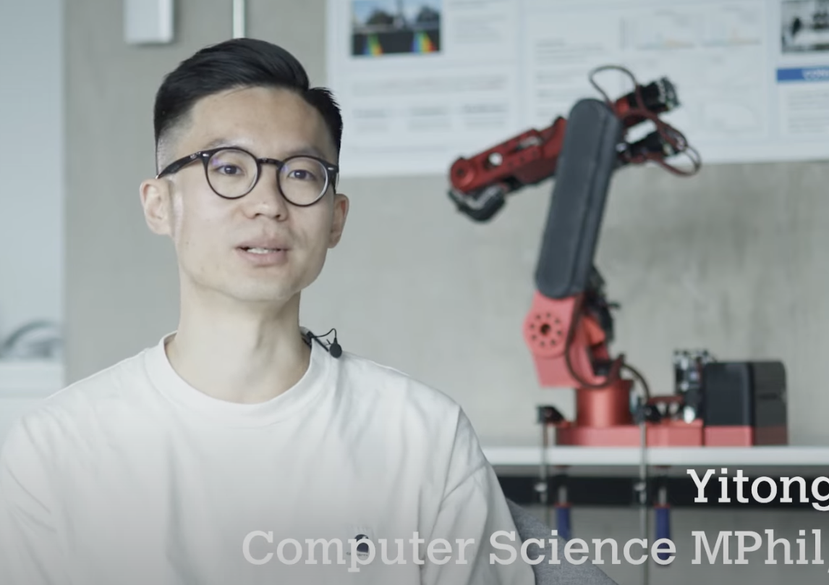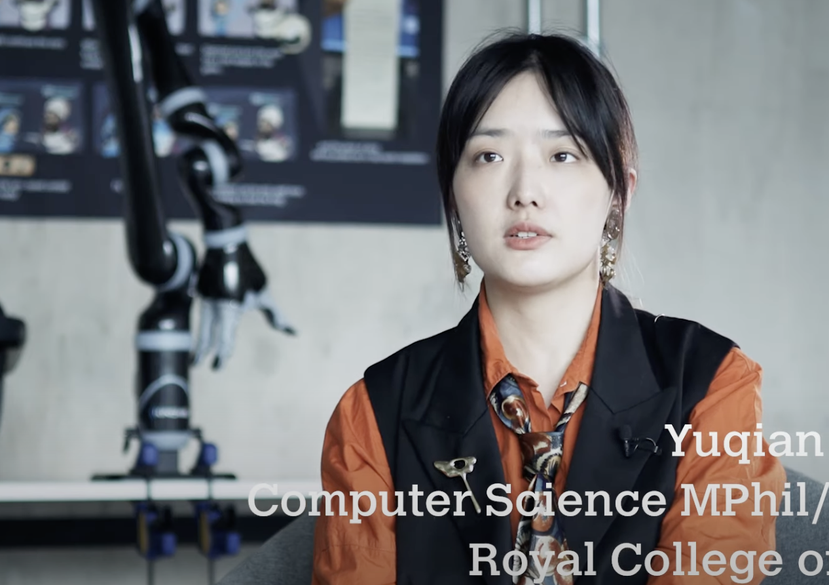
Key details
Date
- 10 November 2023
Author
- RCA
Read time
- 4 minutes
Yuqian Sun has won the Lumen Prize’s 2023 Student Award, while Yitong Sun was awarded Best Paper Award at IMET 2023. Both are Computer Science PhD candidates at the RCA, researching Artificial Intelligence (AI) within the Computer Science Research Centre.
Key details
Date
- 10 November 2023
Author
- RCA
Read time
- 4 minutes
Yuqian Sun won the Lumen Prize’s 2023 Student Award for her research into Artificial Intelligence (AI). Judged by a panel of curators from institutions such as Tate, the Whitney Museum and HEK Basel, the Lumen Prize has celebrated the very best art created with technology from across the globe since 2012.

Yuqian Sun was awarded the Student Award for her project Hyborg Agency
Yuqian’s award winning project, Hyborg Agency, is an interactive art installation that integrates a digital forest with a human Discord chat channel, enabling communication with AI deer or 'hyborgs', driven by GPT-4.
Metaphorically, the forest symbolises human society. It demonstrates how trust, knowledge and data within human society became the soil and nutrients that grow these AI agents. The project focuses on the large language model (LLM) ChatGPT, which learns from text, and explores whether communication with human society can nourish non-human AI agents into social members.
By treating AI agents as subjective interfaces to a fictional world, it bridges the virtual-real divide, and creates a relationship that evolves to allow AI growth. The Hyborgs possess past memories and curiosity about human society, and are able to share memories with each other. Through the two-way interplay of virtual environment and daily communication, this project delves into a speculative future in which non-human AI are naturally raised by human society.

Hyborg Agency on display at the Lumen Prize
“The Lumen Prize has been an aspiration of mine since my undergraduate days,” Yuqian says. “To receive it now – especially at a time when AI agents, which I am passionate about, are starting to receive attention – is truly an honour. For me, the AI chatbot is a medium of art, so I hope my work can convey the artistic aspect of large language models to everyone.”
Yuqian’s project was completed in collaboration with Chenhang Cheng, Chuyan Xu, Cory Lee, and Jun Peng, with music produced by Yufan Xie and the character contribution from Niq. This project was created using the Needle Tool.
“The Lumen Prize has been an aspiration of mine since my undergraduate days. To receive it now — especially at a time when AI agents, which I am passionate about, are starting to receive attention — is truly an honour.”
Yitong Sun, meanwhile, won Best Paper Award 2023 at the International Conference on Interactive Media, Smart Systems and Emerging Tech (IMET) in Barcelona, for his paper ‘ReSenv: A realistic earthquake simulation environment based on Unreal Engine.’
Yitong’s PhD research focuses on using AI to improve and innovate colour rendering methods, lighting settings, and interactive modalities within Virtual Reality (VR) systems to mitigate negative side effects, such as motion sickness or dry eye syndrome. His techniques have also been applied to VR applications for disaster relief, such as for earthquake rescue training and fire evacuation simulations.

Yitong Sun presenting at the Interactive Media, Smart Systems and Emerging Tech Conference in Barcelona
His paper introduced an innovative earthquake simulation environment using the Chaos Physics System in Unreal Engine. As his paper highlights, earthquakes have a profound impact on human lives and economic activities, making efficient search and rescue operations paramount to reducing losses. As AI and robotics gain traction in rescue missions, the demand for high-quality simulated visual data grows. Existing quake simulation techniques mainly target individual building damage, lacking realism in multi-building urban settings.
This approach delivers high-resolution visual and synthetic scenario data for AI and robotic rescue missions. It leverages the game engine's prowess to achieve photo-realistic rendering, precise physical interactions, and three-degree-of-freedom geological movements. This efficient and user-centric approach surpasses traditional simulation tools. The game's environment offers unparalleled detail and realism, becoming a valuable data resource for AI training in pathfinding and image recognition for earthquake rescue. His paper proves the utility of this method across three AI tasks: similarity detection, path planning and image segmentation.
“Winning this award [...] showcases that new technologies and AI are not just about enhancing the precision and usability of quake simulations but crucially, they stand as pivotal tools in saving lives during disasters.”
“Winning this award reflects the deep understanding of the prolonged severe impacts earthquakes have on lives, culture, and the economy” Yitong says. “It also showcases that new technologies and AI are not just about enhancing the precision and usability of quake simulations but crucially, they stand as pivotal tools in saving lives during disasters. This recognition fuels our ambition to further break boundaries and better serve humanity.”
“Looking ahead, I plan to expand the scope of disaster simulations to include floods and wildfires and integrate interactive training through VR technology, aspiring for them to play a substantive role in real-world disaster rescues in the future.”
Professor Dr Hala Mansour, Head of Doctoral Programmes at the RCA, extended her congratulations to both students:
"Heartfelt congratulations to Yitong and Yuqian on receiving the awards for the outstanding conference paper. Your dedication to research and quality of academic contribution have thoroughly shone through. This recognition is a testament to your hard work and scholarly excellence. We are at RCA encourage students to present their research in conferences and build their academic community."

